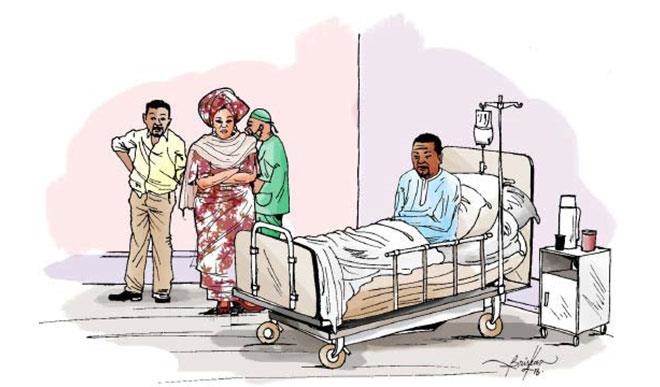Public hospitals reject us, FCT IDPs lament
Internally Displaced Persons (IDPs) living in Abuja have lamented that public hospitals in the Federal Capital Territory have continued to shut their doors against them, whenever they go there for treatment. IDPs at a camp at Durumi, Area One, Abuja, specifically mentioned being denied access to treatment at National Hospital Abuja, the Police Staff Clinic, […]


Internally Displaced Persons (IDPs) living in Abuja have lamented that public hospitals in the Federal Capital Territory have continued to shut their doors against them, whenever they go there for treatment.
IDPs at a camp at Durumi, Area One, Abuja, specifically mentioned being denied access to treatment at National Hospital Abuja, the Police Staff Clinic, alongside district hospitals in Wuse and Asokoro because they could not afford to pay for treatment.
Isah Haruna, 19, lives at the Durumi camp – known as Monkey village. By day he hangs out at a recharge card stall near a small market to escape the gloom and hunger in Monkey Village. One fateful evening last December, a stray bullet caught him while personnel of the Nigerian Civil Defence Corps engaged in a shooting spree at a junction near the Old Federal Secretariat in Area One.
Two others were also wounded in the shooting, right next to a night shawarma spot.
Police picked up the injured, pieced together necessary documentation, and rushed them to hospital, Aso Chronicle learnt.
Families of the other two injured persons came for them but Haruna had no one except fellow IDPs. He was unable to pay the medical bill which was in the range of N100,000 for the four days he stayed in hospital before he was discharged.
“I was discharged, but detained. And because I wasn’t on admission at the hospital anymore, I didn’t get any food,” he said.
He said fellow IDPs brought him food daily but his bill ran close to N500,000.
In another instance, according to documents seen by our reporter, Fatima Idris, 16, underwent a caesarean section to give birth to her daughter Hauwa at the National Hospital.
Her bill from December 12 when she was admitted to December 23 totalled N195, 580, and they couldn’t pay.
Idris Ibrahim Halilu, the camp’s coordinator for governmental and public affairs, said the patients were detained for days while daily stay at the hospital pushed their bill to nearly N500,000.
Aso Chronicle learnt that Fatima’s husband Ahmadu Idris paid N26,000 on December 12, and another N26,090 by December 18 to the hospital.
“As an IDP from Gwoza, Borno, I am not employed. my family and I depend on donations from individuals and non-government organisations to be able to feed,” he lamented.
He said it was traumatic visiting his recuperating wife and new born daughter in hospital but being unable to take them back to Monkey Village because he could not afford the medical bill.
The camp, through its secretary, chairman and coordinator for governmental and public affairs, turned to appeal.
On December 18, it wrote the office of the Secretary to the Government of the Federation (SGF) asking that the Presidency foot bills for IDPs at the four hospitals on “compassionate and humanitarian grounds.” The letter was not received until December 23.
“If government hospitals can reject IDPs in their own country, I wonder who else can save the IDPs,” said Idris Ibrahim Halilu, the camp’s coordinator for governmental and public affairs.
Aso Chronicle learnt that the Police Clinic began shutting out IDP patients after an endowment posted by the wife of the Inspector General of Police for their treatment was exhausted.
Police Clinic is the same hospital where non-government groups like the Plan Parenthood Federation of Nigeria pay for women to attend antenatal clinic and treat children’s illnesses.
Since then, camp coordinators claimed hospitals have detained IDPs for inability to pay medical bills even after they presented identification to prove they belong on camps for displaced persons.
National Hospital authorities said they didn’t detain any patients but have treated IDPs on grounds of social responsibility and waived every applicable fee.
But the hospitals spokesperson Tayo Haastrup told our reporter that it doesn’t have a secure fund to continue providing free treatment.
The hospital’s medical social welfare unit investigates patients who came to be too poor to pay medical bills, which are waived when investigations are concluded, Haastrup said.
But the problem is once a patient’s bill is waived, many more come to the hospital expecting to be treated free too, Haastrup explained.
A medical centre built by the Nigerian Army Officers Wives Association on the camp stocks medicines and is manned by an official with “basic training in first aid,” according to camp residents.
The unit was supposed to be visited at intervals by a doctor or nurse to attend to cases on camp, but residents say there has been none since it was established. That is where Abubakar Idris, wounded in a car crash, has been receiving treatment.
The camp is also concerned about the “dangers” in leaving prescription drugs in stock at the unit to be dispensed by non-medical personnel.
